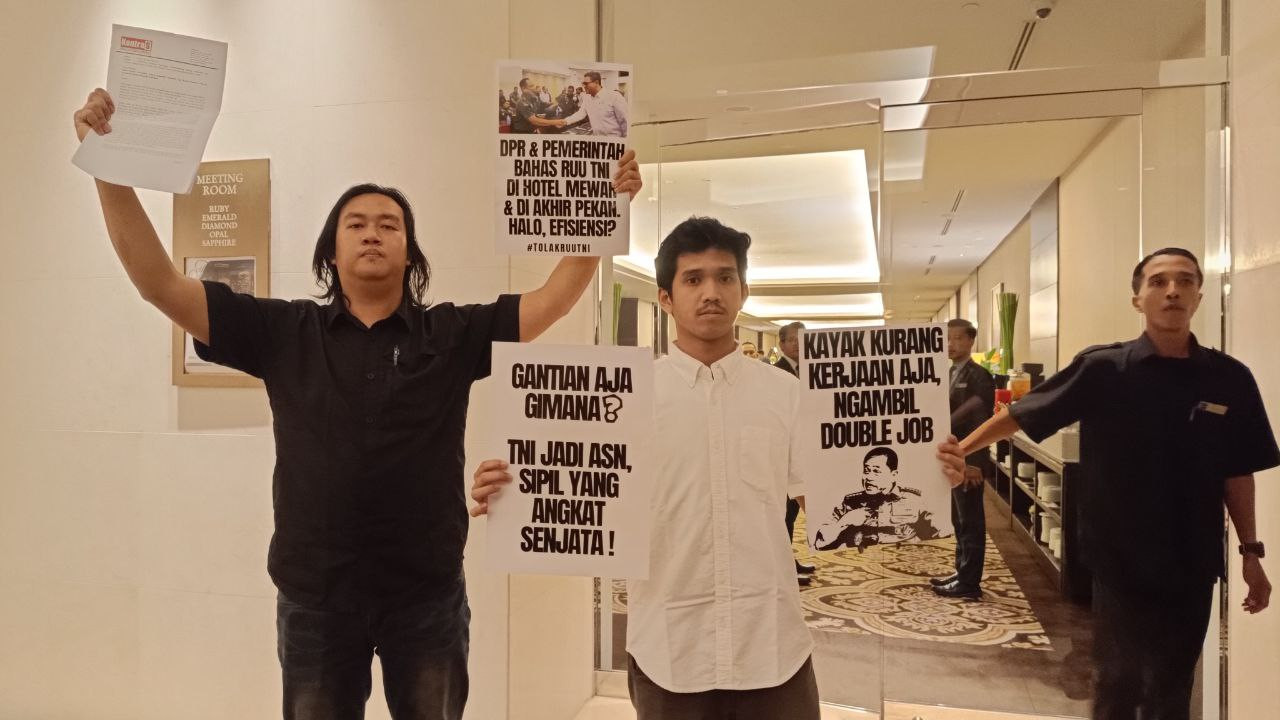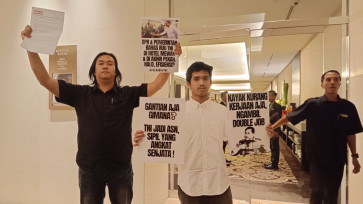Popular Reads
Top Results
Can't find what you're looking for?
View all search resultsPopular Reads
Top Results
Can't find what you're looking for?
View all search resultsTNI Law revision must uphold civilian supremacy and human rights
TNI soldiers must have the capacity, capability and professionalism to protect the people and uphold democracy and civilian supremacy.
Change text size
Gift Premium Articles
to Anyone
 Three activists from the Civil Society Coalition for Security Sector Reform enter a room on Saturday in Jakarta’s Fairmont Hotel, in which a secret, closed-door meeting between the government and members of the House of Representatives took place to discuss revisions to the Indonesian Military (TNI) Law. (Kompas/Dian Dewi Purnamasari)
Three activists from the Civil Society Coalition for Security Sector Reform enter a room on Saturday in Jakarta’s Fairmont Hotel, in which a secret, closed-door meeting between the government and members of the House of Representatives took place to discuss revisions to the Indonesian Military (TNI) Law. (Kompas/Dian Dewi Purnamasari)
T
he controversy over the revision of Law No. 34/2004 concerning the Indonesian Military (TNI) persists as many fear it restores the military’s dual function rather than building a more professional and capable armed forces amid rising global challenges.
Public disapproval was evident after House of Representatives lawmakers and government officials were found discussing the draft revision at a five-star hotel in South Jakarta on March 15, a stone's throw from the parliamentary building. The activity sent the wrong message about the lack of transparency in the deliberation of the bill and the policymakers’ defiance of Presidential Instruction No. 1/2025 on budget efficiency.
Revising the TNI Law is necessary not only for the interests of the military, but also for the people and the nation. The law has been around for more than 20 years, and should be evaluated, reviewed and revised according to the needs and challenges of the times.
However, the amendments to be made to the TNI Law concern normative and pragmatic matters. The revision only touches on the relationship between the TNI and the Defense Ministry, the addition of civilian posts that can be occupied by active TNI officers, the addition of military operations other than war, duties and the extension of military members’ retirement age.
The draft increases the number of civilian posts that TNI officers can occupy from 10 to 16. On Monday, however, the lawmakers reduced the number to 15 by eliminating the TNI’s possible involvement in the Maritime Affairs and Fisheries Ministry.
The civilian institutions where TNI officers can sit without giving up their military careers are the State Secretariat, the Military Secretariat at the Presidential Office, the Office of the Coordinating Political and Security Minister, the Defense Ministry, the National Cyber and Encryption Agency (BSSN), the State Intelligence Agency (BIN), the National Resilience Council (Lemhannas), the National Narcotics Agency (BNN), the National Disaster Management Agency (BNPB), the National Search and Rescue Agency (Basarnas), the National Counterterrorism Agency (BNPT), the Maritime Security Agency (Bakamla), the Attorney General's Office (AGO), the Supreme Court and the National Border Management Agency (BNPP).
When it comes to the military soldiers’ retirement age, non-commissioned officers can serve until they are 58 years old, while middle- and high-ranking officers until they are 60 years old.


















